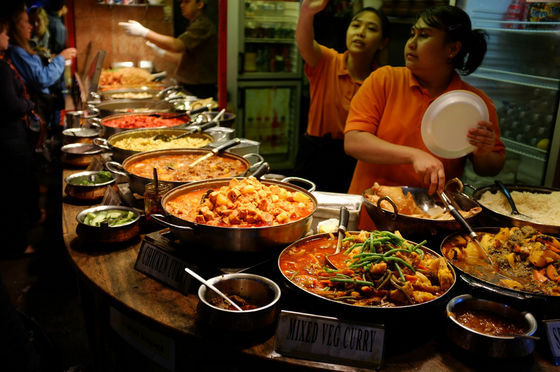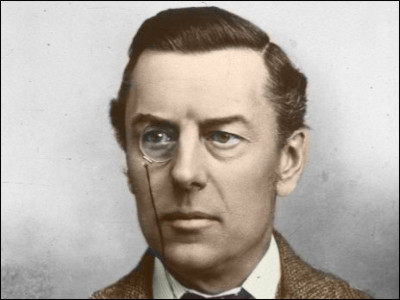What is the reason why 'curry' was accepted and spread in British food culture?

by Ewan Munro
Britain, which has a cold climate and lacking nutrients, often gets ridiculed as "food culture is poor" globally, and Mr. Jacques Chirac, former French President, said, "The citizens who make such a bad food can not be trusted There are things that have been told off . However, there are many "curries" of their own in the UK which once dominated India and Pakistan. The BBC summarizes why curry born from foreign cooking has settled in the food culture of Britain.
The men and women who brought curry to Birmingham - BBC News
https://www.bbc.co.uk/news/uk-england-birmingham-42542081
Indian cuisine and spices were introduced to England in the 17th century, and in 1747 recipes for "curry" have already been published. However, since spice was a luxury item at that time, only some upper classes were able to speak curry, and citizens could not speak. after that. Curry powder was sold at the end of the 18th century and curry was also made in ordinary households but it was far from dishes like those eaten in India and Pakistan.
It was about 150 years later that the British came to touch Indian cuisine in earnest. Abdul Aziz, who worked for a British navy ship until about 1940, was the first Bangladeshi to settle in the industrial city, Birmingham , located 160 km northwest of London. Mr. Aziz married Mr. Violet who was waitressing at the café in Birmingham city and worked at a factory with a couple while accumulating funds to open a restaurant.
In 1945, Mr. Aziz opened a dreamy restaurant "Darjeeling" in one corner of Birmingham. In the vicinity of Darjeeling, there was a local police station, police officers seemed to have come all to eat, the reputation of curry of Darjeeling spreading to judges and lawyers from the police officer in the word. Eventually, Mr. Aziz 'curry rice became a signboard dish, and Darjeeling became a famous restaurant loved by locals.

In addition, it seems that many settlers from Bangladesh and Pakistan who can not find a job often listened to the reputation of the shop and visited Darjeeling, "I want you to work". Mr. Aziz accepted the settlers and hired as the chef and the waiter while living on the second floor of the store. Many curry craftsmen fluttered from Darjeeling, spreading foreign cooking "curry" to Birmingham. At the same time, a strong community of Bangladesh was born locally.
By around 1960, the Bangladeshi restaurant in Birmingham "Jinna" began offering curry take-home and home delivery service, but this take-home and home delivery service was born from a reasonable effort. In jinna we offered various kinds of curry such as chicken, beef, shrimp, lentils, potatoes, etc. It was well received and had many regular customers. One of the regular customers was John Bonham , a drummer of the rock band " Red Zeppelin ".

by Dina Regine
At that time the Bonham was still playing the drum while traveling across various bands before joining the Led Zeppelin. One day, Bonham came up with the idea of directly delivering curry for a regular that he could not go to a restaurant. "I was told that customers can not go to the restaurant for some reason, so I said" I will bring the curry to you if you call me. "Then I ask for curry home delivery As the number of customers grew steadily, the time to deliver curry to someone has been longer than the time I eat curry at a restaurant, "he says, Bonham said. From Bonham's inspiration, in Birmingham curry take-away and home delivery service became popular, so more people could feel free to enjoy curry.
In 1957, Mr. Nurjuman Khan departed from Bangladesh, relied on a citizen living in Birmingham. Mr. Khan learned various manners and skills for the restaurant staff in the suburbs of London to provide meals and had a great influence on the business style of the curry store in Birmingham. In addition, I became a manager of an Indian restaurant by introducing my acquaintance, devising a new menu and devising a system that provides various warm foods. As a result, the Indian restaurant has gained great popularity in the UK, and at the same time curry has become increasingly recognized not only in Birmingham but also in the general public in London.
"Most of the people who come to the restaurant are Indian people who know the taste of Indian cuisine and Bangladeshi people did not eat Indian cuisine at that time and asked the British to try Indian cuisine, We introduced the world of Indian cuisine, "Khan said.

by Karsten Seiferlin
Now it is said that about 150,000 Bangladeshi workers in British curry stores are said to exist, and over 9,000 curry shops exist throughout the UK. It is not an exaggeration to say that the curry culture of the UK is supported by the communities of Indian, Pakistanians and Bangladeshes who grew up in Birmingham.
In modern Birmingham, Pakistani-style curry which entered a Chinese-style iron pot called " Baluchi " is a specialty dish. Balchi was invented at the Pakistani restaurant "Adil" around 1980, and the popularity exploded quickly. There are more than 50 shops in Birmingham that behave Baluchi, and the area where many Indians and Pakistani people live is called "Baluchi Triangle". The popularity of Balchi is not limited to Birmingham, and it seems that the number of shops that make balancing in London and Manchester is increasing.
Related Posts:
in Food, Posted by log1i_yk







